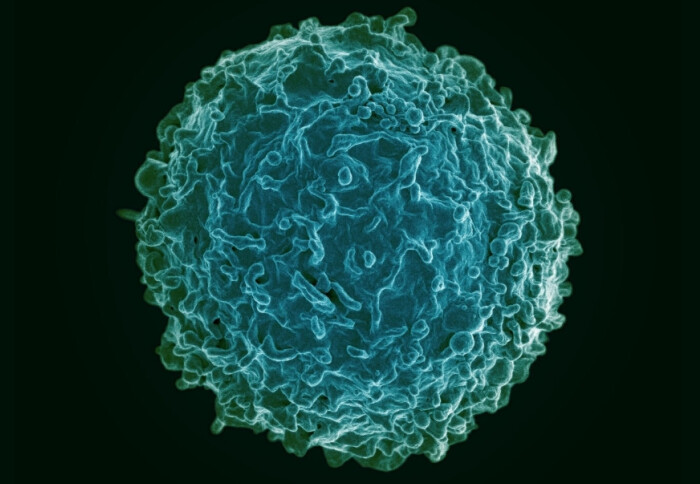Ikaros and NuRD: A crucial partnership
by Thomas Wells

New work has shown how a protein important in the development of B cells can repress target genes and regulate cell growth in leukaemia cells.
New research from the MRC Laboratory of Medical Sciences (LMS) has revealed how a protein called Ikaros, which is important for the development of blood cells, recruits a crucial binding partner, the protein complex NuRD, to repress target genes and regulate cell growth in leukaemia cells.
IKZF1 (Ikaros) is a protein essential for the development of B cells, antibody-producing white blood cells that play an important role in our immune system. Ikaros is a transcription factor, a regulator that binds DNA to control the degree to which genes switch “on” or “off”. Deregulated gene expression can lead to diseases such as cancer. Ikaros is mutated in many patients with B-cell acute lymphoblastic leukaemia (B-ALL), a fast-growing blood cancer characterised by the overproduction of immature B cells. How Ikaros regulates gene expression to control B cell development is an important question in the field.
In research published today in the journal Blood, Dr Tianyi Zhang, a Sir Henry Wellcome Postdoctoral Fellow at the LMS, has discovered how Ikaros partners with the NuRD protein complex to switch off genes and to suppress B-ALL. The study was led from the Lymphocyte Development Group and Single Molecule Imaging Group, headed by Professors Matthias Merkenschlager and David Rueda, respectively, and was expertly supported by Bioinformatics and Proteomics facility staff at LMS.
In humans, animals and plants, the DNA in our cells is packaged into a dense structure called chromatin, which prevents proteins from being able to easily access DNA during processes such as transcription (the process of turning genes on). Transcription factors work in concert with a host of chromatin-modifying factors to shape the chromatin environment to either promote or inhibit gene expression.
Tianyi uncovered that Ikaros preferentially associates with co-repressors, proteins that modify the chromatin environment to inhibit transcription, with NuRD as the major interaction partner. Ikaros recruits NuRD to target genes and their regulatory regions, and work together to switch off these genes. Importantly, the genes repressed by Ikaros are deregulated in B-ALL when Ikaros is mutated.
This study elucidates a specific region in Ikaros that is crucial for its ability to bind NuRD. Notably, mutations within this region of Ikaros and other Ikaros family members are found in patients with different types of blood cancers including B-ALL. The authors show that removal or mutation of this critical region disrupts the ability of Ikaros to interact with NuRD. The loss of NuRD-binding means that Ikaros can no longer silence target genes or slow the growth of pre-B and B-ALL cells.
“Studies spanning the past two decades have looked into the partnership between Ikaros and NuRD. It’s really exciting that technological advances like improved mass spec sensitivity and AI protein prediction tools have allowed us to get a better molecular and functional understanding of the interaction between Ikaros and NuRD” says Tianyi, lead author of the study.
These findings give us key insights into how Ikaros and NuRD cooperate to regulate gene expression in B cell development, and how disruption of this interaction could have damaging consequences. Importantly, this work also provide understanding of Ikaros’s role as tumour suppressor in B-ALL, which could potentially help researchers develop novel treatments in the future.
Tianyi is now at the end of her journey at the LMS, and we’re excited to share as of January she has started as Birmingham Springboard Fellow. This fellowship will support her transition to independence in the College of Medicine and Health, University of Birmingham. Good luck Tianyi!
This work was funded by the Wellcome Trust, the Medical Research Council, and the Leverhulme Trust.
Zhang, T., Wang, Y. F., Montoya, A. et al. Conserved helical motifs in the IKZF1 disordered region mediate NuRD interaction and transcriptional repression. Blood 145, 4 (2025). https://doi.org/10.1182/blood.2024024787
Article supporters
Article text (excluding photos or graphics) © Imperial College London.
Photos and graphics subject to third party copyright used with permission or © Imperial College London.
Reporter
Thomas Wells
Department of Chemistry